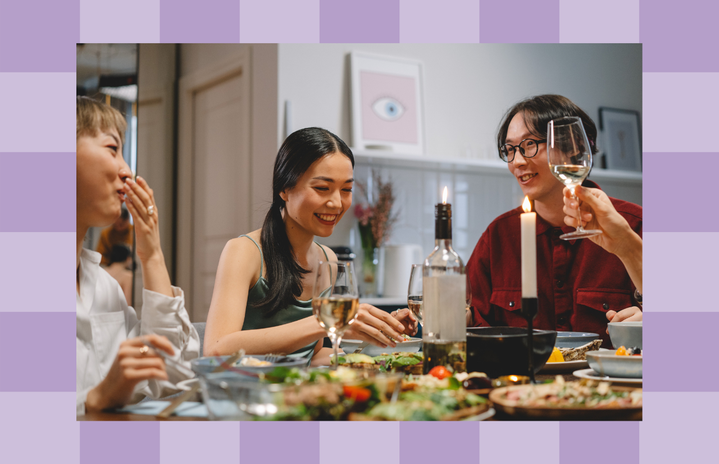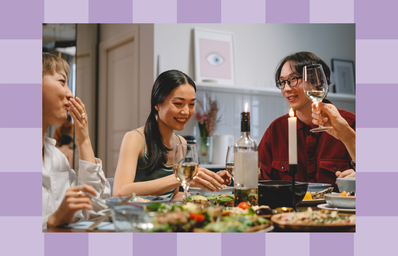[Content Warning: this post contains references to eating disorders and mental health]
The phrase ‘girl dinner’ was coined on TikTok earlier this year by a woman called Olivia Maher while posting about her dinner of bread, butter, grapes, cheese and wine. The cute name, as well as the idea of a light meal, quickly thrown together, consisting of snack foods, immediately took off and became an online trend, with women all over the world posting their own ‘girl dinners’.
What counts as a ‘girl dinner’ seems to be incredibly broad – with everything from a bowl of popcorn to cheeseboards to a cigarette and a can of diet coke being posted online under the catchy title of ‘girl dinner’. Maher herself later stated in an interview with the Today Show that “girl dinner can look like many things” depending on your cravings and needs – the key thing is the “giddiness” that goes along with it.
While I am all for enjoying some charcuterie and listening to what your body wants, I, along with many other women around the world, couldn’t help but notice that more and more of the ‘girl dinners’ that appear online barely seem to constitute a meal.
Maher herself has since clarified that you don’t need to eat a girl dinner every night, framing it more as a ‘treat’ or something to honour what your body wants at that moment. Although I agree that having quick snack meals of whatever you have lying around, especially as a busy student, can be convenient and enjoyable, I think that the problem with girl dinner, as with any online trend, is that the original context is often lost. It doesn’t matter what Maher says was originally the idea behind ‘girl dinner’ because as soon as something becomes a trend it soon takes on a life of it’s own, with each person reposting about a ‘girl dinner’ changing the very meaning of what a ‘girl dinner’ is.
Nonetheless, I can see how ‘girl dinner’ can be viewed, as it has been argued to be my many, as a fun carefree meal – a representation of intuitive eating, with women breaking free from the constant stream of online voices telling them how they should be eating and tap into to their body’s needs and cravings. However, in response to this argument I would question how the ‘girl dinner’ trend has any way of preventing itself from just adding to that constant stream of chatter online about how girls should and do eat.
If I’m putting it plainly, the problem, in my opinion as someone who has actually been diagnosed and recovered from anorexia, is that many of the girl dinners I see online show signs of disordered eating. Note that I say “disordered eating” rather than “eating disorders” – the two are very different, the first is an abnormal and unhealthy eating pattern and the latter is the clinical diagnosis of a serious mental health condition. Nonetheless, gone unchecked, disordered eating can later develop into an eating disorder – which then becomes a serious medical issue that can take years to recover and heal from.
While some women may be posting their ‘girl dinner’ because they are genuinely intuitively eating and honouring their cravings, for others this can become a new benchmark or judgement on how they should be eating. The context is lost and that’s how this trend has the potential to become so dangerous.
Furthermore, it’s interesting to think about the language being used. With many of the ‘girl dinners’ online being more of a snack than a well-rounded balanced dinner, this worryingly seems to normalise disordered eating patterns for girls, because this is just “what a girl’s dinner looks like”. Moreover, it’s interesting that it’s “girl” dinner, not “woman” dinner. I would certainly be curious to see what a “woman dinner” trend would look like – is this when you would finally see women eating full meals rather than a plate of pickles?
Now, I know some of you reading this may be rolling your eyes, thinking that I am overacting on just how dangerous this trend can be. I would argue, however, that you are underestimating just how powerful social media can be. We hear it all the time, and you may often think it is an oversimplified conclusion, that social media trends are causing all the ills in the younger generation – but I would claim that that conclusion holds some truth. As I mentioned earlier, the main issue with social media trends is that context is lost when people begin reposting and altering the original message. While ‘girl dinner’ may have started as a celebration of intuitively eating and treating yourself, and for some it may still be, the message has been warped and shifted to something where disordered eating patterns are posted under that same title. For people who are already struggling with or vulnerable to an eating disorder, that original good message doesn’t have much effect – what does is the competitive and comparative aspects of social media that makes them question how they should be eating.
So, as long as vapes and cans of coke are being posted under the title of ‘girl dinner’, the trend remains, in my opinion, potentially harmful and could lead to someone developing what I know to be an incredibly debilitating, painful and dangerous condition.
If you or someone you know is struggling with disordered eating, visit BEAT for information on help and treatments available


